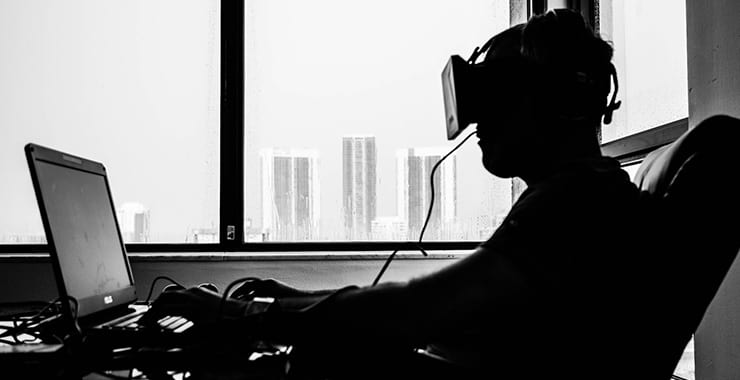Want to catch a music concert live from the comfort of your own home?
What about front row seats to the next basketball game while you’re still in the office?
Perhaps you really want to be a part of a major conference overseas that you couldn’t make time for.
With virtual and augmented reality technology, the possibilities are endless. This is an introduction to a series of articles related to this exciting side of immersive technology and how it could shape the future of events for you. Strap yourselves in and get your headsets on.
Virtual Reality (VR)
What is virtual reality?
A quick Google search defines virtual reality as “the computer-generated simulation of a three-dimensional image or environment that can be interacted with in a seemingly real or physical way by a person using special electronic equipment, such as a helmet with a screen inside or gloves fitted with sensors.” This is a concept that has been explored even before the 1950s in fictional books, and has been undergoing research since the late 1960s. What was one the subject of science fiction is now a reality-in-progress in 2015. For people who are not really familiar with the subject, they may still come across names like the Oculus Rift, Sony’s Project Morpheus, Samsung’s Gear VR and HTC’s Vive in today’s news. With the amount of companies that are investing time and money in the development of VR products, this market segment is expected to grow considerably over the next few years.
Take for example the recent E3 2015 where VR was a hot topic in one of the largest electronic gaming conventions in the world. Oculus VR unveiled its latest iteration of the Oculus Rift protoype for attendees to experience what a consumer VR headset could offer on a Windows platform. It is expected to ship during the first half of 2016.
Project Morpheus, Sony’s answer to VR for the Playstation, was also featured at the expo with a new range of games – although most of them were still in pre-alpha stages. Even a bike with sensors was set up as well for attendees to better experience the headset.
Imagine what you could do with cool technology like these in events. You could provide a whole new live streaming experience for people unable to be physically present at your event. You could reach out to people on a global scale. A music concert happening halfway around the world could be viewed live – and not just viewed it like any other live stream. People could view it like they were actually there using VR. You could even give people the opportunity of viewing from angles that are normally not feasible – like a top down shot of a basketball game, but feeling like you’re hovering over the court with 360-degree capabilities. You could create brand new experiences that you might never have achieved physically.
Augmented Reality
Then there’s augmented reality, “a technology that superimposes a computer-generated image on a user’s view of the real world, thus providing a composite view.”
Take a look at Microsoft’s demo of the HoloLens at BUILD 2015.
It doesn’t stop there. Wait till you see what they’ve done with MineCraft at E3 2015:
It’s no wonder NASA has teamed up with Microsoft to use this holographic computing technology on the International Space Station. They believe that this will help astronauts function more efficiently, and with less training. Though faced with a setback due to a failed launch on June 29th, I hope the ISS gets a hold of these soon and take it further in space applications. Very exciting – but I digress.
With such interactivity available at your fingertips in virtual space that leverages on your physical surroundings, create an immersive event experience for your attendees even in the smallest of spaces. Get attendees further involved using AR in ways that are only limited by your imagination.
With VR and AR having come this far in development, they could be major game changers in the events industry. It is truly a very interesting time for us.
What do you think?
Do you think VR and AR could play very big roles in events, or do you disagree?
We want to hear from you. Let us know what you think in the comments section below!








